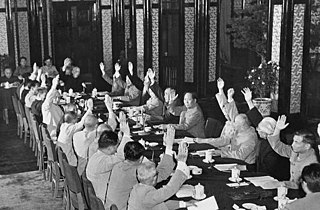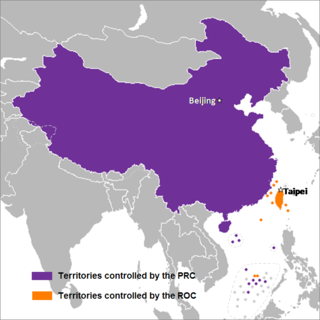
"Mainland China", also referred to as "the Chinese mainland", is a geopolitical term defined as the territory under direct administration of the People's Republic of China (PRC) in the aftermath of the Chinese Civil War. In addition to the geographical mainland, the geopolitical sense of the term includes islands such as Hainan, Chongming, and Zhoushan. By convention, territories outside of mainland China include:

The president of the Republic of China, commonly known as the president of Taiwan, is the head of state of the Republic of China (Taiwan) as well as the commander-in-chief of the Republic of China Armed Forces. The position once had authority of ruling over Mainland China, but its remaining jurisdictions has been limited to Taiwan, Penghu, Kinmen, Matsu, and other smaller islands since the conclusion of the Chinese Civil War.
The controversy surrounding the political status of Taiwan or the Taiwan issue is an ongoing dispute on the political status of Taiwan, currently controlled by the Republic of China (ROC). This dispute arose in the mid-twentieth century.
The term One China may refer, in alphabetical order, to one of the following:

The Constitution of the People's Republic of China is the supreme law of the People's Republic of China. It was adopted by the 5th National People's Congress on December 4, 1982, with further revisions about every five years. It is the fourth constitution in PRC history, superseding the 1954 constitution, the 1975 constitution, and the 1978 constitution.

Rosamond Soong Ch'ing-ling was a Chinese political figure. As the third wife of Sun Yat-sen, then Premier of the Kuomintang and President of the Republic of China, she was often referred to as Madame Sun Yat-sen. She was a member of the Soong family and, together with her siblings, played a prominent role in China's politics prior to and after 1949.

The Constitution of the Republic of China is the fifth and current constitution of the Republic of China (ROC), ratified by the Kuomintang during the Constituent National Assembly session on 25 December 1946, in Nanjing, and adopted on 25 December 1947. The constitution, along with its Additional Articles, remains effective in ROC-controlled territories.

The General Secretary of the Central Committee of the Chinese Communist Party is the head of the Chinese Communist Party (CCP), the sole ruling party of the People's Republic of China (PRC). Since 1989, the CCP general secretary has been the paramount leader of the PRC.
In the People's Republic of China (PRC), supreme command of the armed forces is exercised by the Central Military Commission (CMC) of the Chinese Communist Party (CCP). A parallel state CMC exists. Legally the two CMCs have separate responsibilities, but the distinction is practically irrelevant because the bodies typically have the same members. Since the 2000s, the CCP General Secretary chairs the CMC, and represents the armed forces in the Politburo Standing Committee, the country's ruling body.

The 1954 Constitution of the People's Republic of China was adopted and enacted on September 20, 1954, through the first session of the First National People’s Congress in Beijing. This constitution was amended and formulated on the basis of the Common Program of the Chinese People's Political Consultative Conference, which served as a provisional constitution in 1949, and is the first constitution of the People's Republic of China. The Constitution of the People's Republic of China is the fundamental law of the People's Republic of China and has the highest legal effect.
The 1978 Constitution of the People's Republic of China was promulgated in 1978. This was the PRC's 3rd constitution, and was adopted at the 1st Meeting of the 5th National People's Congress on March 5, 1978, two years after the downfall of the Gang of Four.
The leading role of the party is a constitutional principle most common in communist states. It holds that the ruling party leads the state by virtue of being the vanguard of the proletariat.

The government of the People's Republic of China is based on a system of people's congress within the parameters of a unitary communist state, in which the ruling Chinese Communist Party (CCP) enacts its policies through people's congresses. This system is based on the principle of unified state power, in which the legislature, the National People's Congress (NPC), is constitutionally enshrined as "the highest state organ of power." As China's political system has no separation of powers, there is only one branch of government which is represented by the legislature. The CCP through the NPC enacts unified leadership, which requires that all state organs, from the Supreme People's Court to the President of the People's Republic of China, are elected by, answerable to, and have no separate powers than those granted to them by the NPC. By law, all elections at all levels must adhere to the leadership of the CCP. The CCP controls appointments in all state bodies through a two-thirds majority in the NPC. The remaining seats are held by nominally independent delegates and eight minor political parties, which are non-oppositional and support the CCP. All government bodies and state-owned enterprises have internal CCP committees that lead the decision-making in these institutions.

The free area of the Republic of China, also known as the "Taiwan Area of the Republic of China", the "Tai-Min Area " or simply the "Taiwan Area", is a term used by the government of the Republic of China (Taiwan) to refer to the territories under its actual control. It is also used as a legal term written in the Additional articles of the ROC constitution and Cross-Strait Act.
The Temporary Provisions Effective During the Period of National Mobilization for Suppression of the Communist Rebellion were provisions of the Constitution of the Republic of China effective from 1948 to 1991 and amended four times by the Central Government of China. They effectively nullified the constitution and established martial law in Taiwan, where civil and political freedoms were curtailed. The official rationale for the provisions was the ongoing Chinese Civil War, but with the demise of the Kuomintang single-party system, the provisions were repealed.

The vice president of the People's Republic of China, commonly called the vice president of China, is the deputy to the president of the People's Republic of China, the state representative of China.

The term "Two Chinas" refers to the geopolitical situation where two political entities exist under the name "China".
The Constitutional history of the People's Republic of China describes the evolution of its Constitutional system. The first Constitution of the People's Republic of China was promulgated in 1954. After two intervening versions enacted in 1975 and 1978, the current Constitution was promulgated in 1982. There were significant differences between each of these versions, and the 1982 Constitution has subsequently been amended several times. In addition, changing Constitutional conventions have led to significant changes in the structure of the Chinese government in the absence of changes in the text of the Constitution.
People's democratic dictatorship is a phrase incorporated into the Constitution of the People's Republic of China and the Constitution of the Chinese Communist Party. The premise of the "People's democratic dictatorship" is that the Chinese Communist Party (CCP) and state represent and act on behalf of the people, but in the preservation of the dictatorship of the proletariat, possess and may use powers against reactionary forces. The term forms one of the CCP's Four Cardinal Principles. Implicit in the concept of the people's democratic dictatorship is the notion that dictatorial control by the party is necessary to prevent the government from collapsing into a "dictatorship of the bourgeoisie", a liberal democracy, which, it is feared, would mean politicians acting in the interest of the bourgeoisie. This would be in opposition to the socialist charter of the CCP.

The President of the People's Republic of China, commonly called the President of China, is the state representative of the People's Republic of China, which on its own is a ceremonial office and has no real power in China's political system. However, since 1993, the post has been held by the general secretary of the Chinese Communist Party (CCP) and chairman of the Central Military Commission, who is China's de facto leader.











